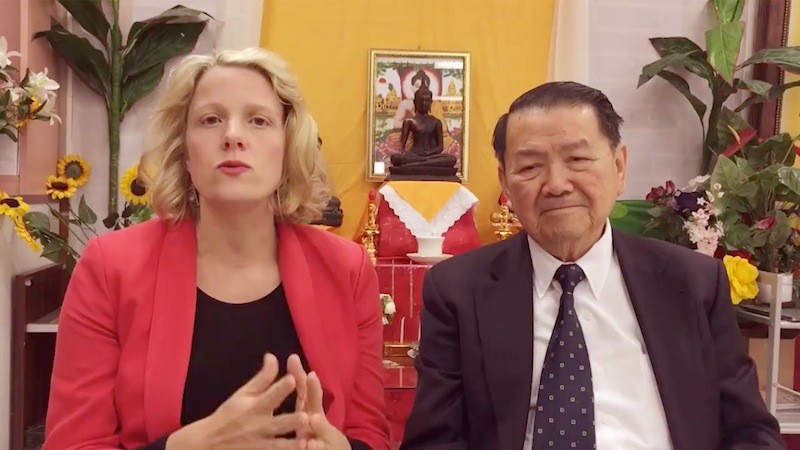An Australian opposition lawmaker representing the large Cambodian community in Melbourne has pledged to put pressure on Prime Minister Hun Sen’s government on issues of human rights and fair elections if she is re-elected on July 2.
Australia is currently amid one of the longest federal election campaigns in its history, with Prime Minister Malcolm Turnbull of the Liberal Party set to face off against the Labor Party’s Bill Shorten in six weeks in a contest believed to be on knife’s edge.

Clare O’Neil, a first-term lawmaker for the Labor Party who is expected to retain her seat of Hotham in Melbourne’s southeastern suburbs, took to Facebook on Saturday morning to say that the results could affect Australia’s relationship with Cambodia.
“Chum reap sour,” Ms. O’Neil says in a video posted to her campaign page on Saturday, using the formal Cambodian-language greeting and sitting next to prominent Cambodian-Australian community leader Youhorn Chea, who fled Cambodia as a refugee in 1982.
“One of the issues that is raised with me very consistently by people in the Cambodian community is concern for the human rights situation in Cambodia,” Ms. O’Neil says.
“I am very aware about concerns about the election that’s to be held in Cambodia in 2018, and I will be doing everything I can working with Youhorn and other community leaders to push the Australian government to push for free and fair elections,” she says.
The lawmaker did not respond to request for comment on Sunday. Yet Mr. Chea, who is a former mayor of Greater Dandenong in Melbourne’s southeast and remains a member of its city council, said her appeal covered both international and domestic issues.
“The community is very concerned about this [Turnbull] government, and we want to support Clare. As you know, Hotham has many Cambodians. There are about four to five thousand Cambodian-Australians, and she is a great asset to our community,” he said.
“The majority of the community in Hotham and in Australia, too, support the Australian Labor Party, because they support the working class and the Australian-Cambodians are mostly working class.”
Koy Kuong, Cambodia’s ambassador to Australia and the head of the CPP’s outreach committee in the country, could not be reached.
However, Kalyan Ky, a member of the CPP and Australia’s Liberal Party who lives in the neighboring electorate of Isaacs, said large numbers of the Cambodian community in Melbourne in fact support the Liberal Party—even if community leaders do not.
“Many Cambodian Australians came to Australia as refugees to escape communism, the socialist perspective and to escape the hierarchal structure. They came to build futures in Australia, to be innovative in their approaches to business,” Ms. Ky said. “Cambodians are natural entrepreneurs. So it’s untrue that most Cambodian-Australians would support Labor, as this is the kind of the existence they were escaping from,” she added, explaining that the Liberal Party’s small-government stance appealed to those voters.
Ms. Ky also said many Cambodians still felt indebted to the late Malcolm Fraser—a Liberal Party prime minister who in the 1970s altered Australia’s policies to allow tens of thousands of people fleeing Cambodia to settle in Melbourne and Sydney.
Mr. Hun Sen’s CPP and Australia’s Liberal Party have slowly grown closer in relations since a $30 million deal was inked between governments run by the two parties in September 2014 for Cambodia to resettle refugees caught at sea trying to reach Australia.
Last year, Prime Minister Hun Sen’s eldest son, Hun Manet, traveled to Australia as part of a group of prominent young leaders of the CPP, meeting with a group led by Simon Breheny, who was then president of the Young Liberals—the Liberal Party’s youth wing.
Yet lawmakers from both the Liberal and Labor parties slammed the CPP in Parliament after the severe state repression of protests and a nationwide garment strike in January 2014 that left five people dead.
In a March 2014 speech, Philip Ruddock, who was then the Liberal government’s chief whip, recalled his visits to Cambodia in the 1980s and said he was not impressed with how things had come.
“When I look at the way in which events have unfolded, I understand that Cambodia is very much what I would regard as a one-party state, with the CPP being in government for such a long period of time,” Mr. Ruddock said at the time.
“I understand that elections are held, and they do not always look the same as ours,” he said.




